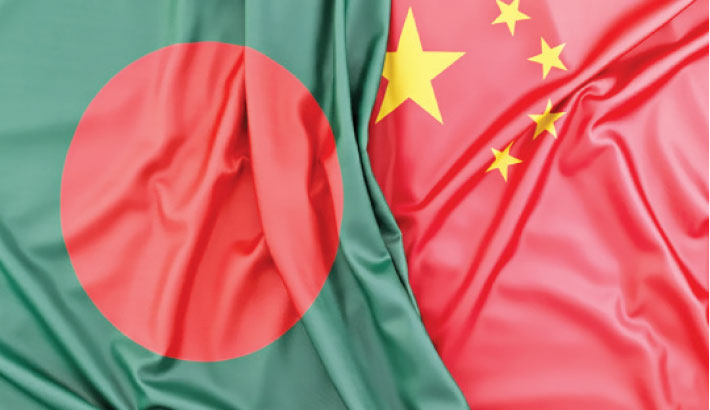Bridging hearts: Unseen ties between Bangladesh and China
Simon Mohsin
Published: 01 Nov 2025

Soft power often operates where diplomacy and economics leave gaps—through culture, education, values and emotions. China’s influence in Bangladesh cannot be explained solely by trade figures or strategic partnerships. Instead, it rests on an emotional foundation of trust, admiration and curiosity. As the geopolitical landscape of South Asia shifts, China’s ability to nurture these sentiments will be critical in consolidating its role as a reliable partner for Bangladesh.

A foundation built on perception
Bangladesh’s public perception of China is strikingly positive. Surveys and qualitative assessments reveal that a majority of Bangladeshis view China as a trusted partner, often ranking it higher than other global powers in terms of reliability and respect for sovereignty. This trust stems not only from China’s extensive economic involvement, such as the Belt and Road Initiative (BRI), but also from its non-interference in Bangladesh’s domestic affairs and its pragmatic approach to development cooperation.

Culture, education and connectivity as catalysts
Soft power thrives when people-to-people connections are nurtured. In Bangladesh, Chinese educational opportunities are increasingly popular. Confucius Institutes, scholarships and university partnerships are opening doors that were once closed. Compared to the United States, Chinese degrees are becoming more affordable, accessible and globally recognised, making them attractive to a new generation of Bangladeshi students.
Still, barriers remain. Language differences and limited exposure to Chinese culture hinder deeper engagement. Many young Bangladeshis view China as an “enigma”—a country respected but not fully understood. To bridge this gap, Beijing could expand cultural outreach through films, music, literature, sports and tourism. For example, student exchanges and cultural festivals could demystify China, making it not just an economic partner but a familiar cultural presence.
Beyond culture, vocational training and technical cooperation represent untapped opportunities. Young people, including madrasa students, expressed a strong interest in Chinese vocational and technical expertise. Expanding such programmes could build goodwill while equipping Bangladesh’s workforce with much-needed skills.
Trust, non-interference and emotional resonance
What distinguishes China in Bangladesh’s imagination is its hands-off approach. Unlike some other powers, Beijing does not dictate Dhaka’s political choices or force it into rigid alignments. This policy of non-interference resonates emotionally, reinforcing the perception that China treats Bangladesh with respect and dignity.
Nevertheless, China’s soft power is not immune to criticism. Its perceived inaction on the Rohingya refugee crisis and its close ties with Myanmar remain points of frustration for many Bangladeshis. These issues highlight that soft power is delicate: admiration can quickly turn to disappointment if emotional expectations are unmet.
Propaganda and the politics of perception
Western narratives of the so-called “China Threat” or “debt trap diplomacy” continue to be echoed in global media. Yet, in Bangladesh, these narratives are increasingly falling on ears that know better. The lived experience of Chinese investment in infrastructure, education and trade speaks louder than alarmist rhetoric. For students who see scholarships expanding, for businesses that find reliable partners, and for media representatives who experience respectful engagement, the Western framing of China as a looming danger feels detached from reality.
This is where the emotional dimension of soft power becomes decisive. Bangladeshi stakeholders often empathise with China as a victim of Western propaganda. They recognise that much of the negative discourse surrounding China is externally manufactured and does not accurately reflect Bangladesh’s own experiences. This recognition does not eliminate concerns—such as on the Rohingya issue—but it reinforces the perception that China is, on balance, a more trustworthy partner than those who try to frame the relationship otherwise.
Harnessing emotional politics for stronger relations
Soft power is not only about cultural diplomacy; it is also about how ordinary people feel about policies. Bangladeshi stakeholders experience a mix of emotions towards China—admiration for its development, trust in its reliability, but also scepticism over sensitive issues. Harnessing these emotions requires careful navigation.
China should broaden its engagement to grassroots communities, not just elites. Expanding vocational programmes, scholarships and cultural outreach would ensure that positive perceptions penetrate deeper into society. At the same time, Beijing must demonstrate greater empathy for humanitarian concerns, particularly with the Rohingya crisis, to show that it is not only a pragmatic partner but also a compassionate one.
Towards a deeper partnership
Soft power complements hard power by embedding goodwill and trust in a relationship. Bangladesh’s positive emotional orientation towards China creates fertile ground for expanding cooperation in education, trade and cultural exchange. By aligning its soft power strategy with Bangladesh’s aspirations—such as technological advancement, skill development, and cultural connectivity—Beijing can strengthen its role as Dhaka’s long-term partner.
For Bangladesh, China’s soft power offers both opportunities and leverage. It allows Dhaka to diversify its partnerships, balance its regional relations, and access resources for economic transformation. By engaging China on cultural and educational fronts, Bangladesh can ensure that the partnership grows more symmetrical and inclusive.
China’s soft power in Bangladesh is still evolving, but the foundations are strong. The admiration for its development model, respect for its non-interference policy and curiosity about its culture provide a promising foundation for future relations.
Moreover, Western propaganda against China continues to lose credibility among those in Bangladesh whose daily realities tell a different story—of opportunities, exchanges, and pragmatic cooperation. The emotional dimension—trust, pride, hope, and at times disappointment—will determine the trajectory of China-Bangladesh relations. If Beijing nurtures these sentiments wisely, it can transform its already robust economic ties into a deeper partnership of hearts and minds. In doing so, China will not only strengthen bilateral relations but also showcase the enduring power of soft power in shaping the geopolitics of South Asia.
Simon Mohsin is a political and
international affairs analyst

